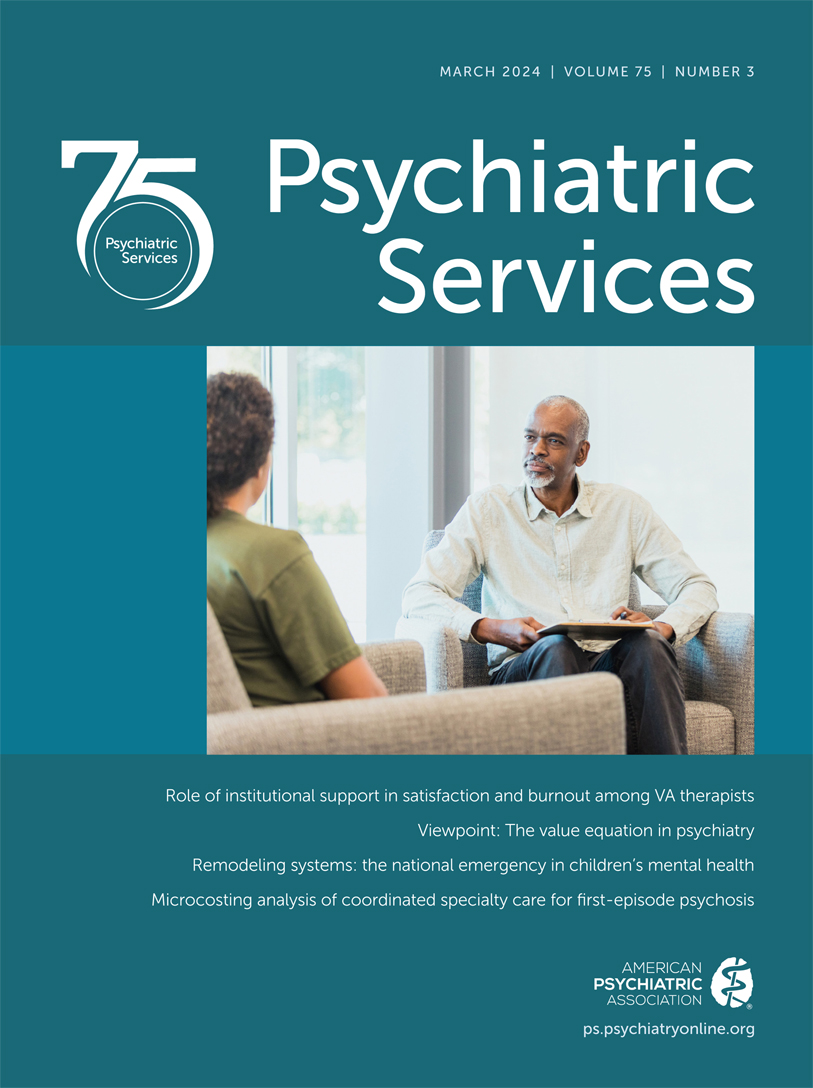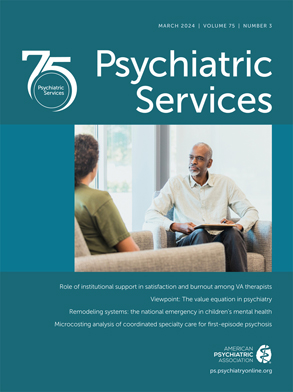Health indicators in the United States are among the worst in the developed world, even though its health care system is, by a wide margin, the most expensive. It is a disparity that stems from a fragmentation of services and from financial arrangements that often prioritize commercial interests over public health. In a recent
JAMA editorial (
1), Berwick considers the role of greed in the for-profit health care business and enumerates the various ways that pursuit of profit affects all aspects of U.S. health care. Pharmaceutical pricing, insurance premiums, exorbitant hospital bills, health care executive salaries, and even physician salaries are among the elements that drive up costs. Mental health services are no exception to these concerns.
These abuses extract a significant amount of money that otherwise would be available for provision of clinical services, but other factors that are indirectly determined by for-profit health care are much more crippling. Despite the high cost of psychiatric care, its outcomes are poor. U.S. rates of suicide and violence surpass those of other developed countries, and reports about distressed youths and the mental health crisis in the United States are abundant. In other words, U.S. health care services are of low value. A book produced by the Group for the Advancement of Psychiatry,
Seeking Value:
Balancing Cost and Quality in Psychiatric Care (
2), considers the indirect factors that reduce the value of services. The authors explore the evolution and meaning of value in U.S. systems of care, the major determinants of value, and strategies to improve value. This Viewpoint will highlight some of the major concepts developed in this book.
As consumers, we commonly think about value when we are considering a purchase, even if this consideration is not a conscious process. This deliberation is typically influenced by the accessibility and desirability of an object. Things that are most difficult to get and that are much coveted typically are considered to be valuable, whereas items that are plentiful and readily available are not highly valued, even if they are quite necessary. Alternatively, as introspective individuals, we also think of value as related to those attributes or ideals we are striving for, and those we choose give our lives meaning and define who we are. Such choices and values are highly individualistic, even within a single cultural group. Unlike physical valuables, these immaterial values and ideals may be variable over time or even contradictory. For example, those who profess to subscribe to certain religious beliefs and the values associated with them do not always act in ways that are consistent with those stated beliefs and values.
Both constructs are relevant in considering the value of medical and psychiatric services. On a basic level, the goal is to have some objective way to measure the value of services provided. A simple equation for doing so may be value = quality/cost. Although there are ways to quantify quality (numeric representations of attaining a desired outcome) and cost (resources needed to obtain these outcomes), stakeholders cannot always agree on what the outcomes should be or on what percentage of limited resources should be made available to achieve them. Both quality and cost may be defined differently, depending on stakeholders’ interests. In a fragmented and profit-driven structure such as the U.S. health care system, these differences in values cause serious conflict in the pursuit of value in health care. In what ways might common ground among stakeholders be found to enhance the value of health care systems?
Perhaps the most egregious contribution to the health care crisis is the system’s focus on illness rather than health. Millions of dollars are spent on managing preventable conditions that were not detected before the onset of acute symptoms or chronic progressions. This scenario is especially dire for individuals who lack easy access to care, such as rural, minority, and indigent populations.
A related issue is the supply of health professionals. The medical workforce is inadequate to meet demand, allowing health businesses to have little concern about competition or quality. In systems that can pool risk among large population groups, providers and payers have a greater incentive to engage in preventive activities, reducing long-term costs. Reducing unnecessary expenses creates higher value.
Another issue is that systems for financing health care rely heavily on fee-for-service billing, which creates an enormous administrative burden. Up to 30% of U.S. health care resources go to system administration. This percentage amounts to at least $500 billion and is about three times the average per capita administrative expense of other developed countries. Systems that have more unified and universal financing methods spend only about 10% of their health care dollars for administration (
3). Fee-for-service billing also incentivizes providers to do more billable services and fewer of the ancillary nonbillable services that help ensure the longevity of symptom reduction (
2). Invasive procedures and expensive medications are often prescribed despite little evidence that they may be more effective than other options. Overtreatment and excessive administrative expenses are both products of this financing arrangement. These expenses are much lower in systems that bundle payments and provide incentives to use cost-effective interventions.
Psychiatry has clearly been complicit in the establishment of the low value of services provided to the public. Biologic reductionism in psychiatry has evolved over the past few decades and has resulted in the overdiagnosis of emotional health conditions and the overprescribing of medications that often provide little benefit and frequently do more harm than good. Psychiatric training programs have acquiesced to this paradigm and have significantly reduced skill development in nonpharmacologic therapies, such as family and group interventions. This deficit reduces trainees’ capacity to provide effective clinical care and supervision of other mental health clinicians (
2). These skills will be increasingly important as the demand for services grows in the years ahead and the supply of psychiatrists shrinks because of an aging workforce. Expanding the scope and capacity of psychiatric practice would enhance the quality of care, again raising the value of services.
The design of the health care system itself is not the only factor that contributes to the low value of mental health services. Social policies such as the prohibition and criminalization of substance use have filled prisons, made unregulated and adulterated substances available (putting users in harm’s way), and failed to rehabilitate and return users to productive roles in society. Likewise, inadequate provision of community-based services and low availability of affordable housing have put many people with mental illness behind bars or on the street, which often aggravates their conditions and reduces the likelihood of recovery (
4). Other misguided social policies add to the mental health burden, and the redirection of resources from counterproductive practices, such as excessive incarceration, to the development of community services would be enormously beneficial to both the numerator and the denominator in the value equation.
Many evidence-based interventions could be employed to increase the quotient of the value equation. The problem is not lack of knowledge about what to do but rather finding the wisdom and will to do what is needed. Strategic planning and advocacy opportunities to address these issues are considered in depth in
Seeking Value:
Balancing Cost and Quality in Psychiatric Care (
5). Readers who wish to learn more about how the value equation may be changed will find much to consider there. Change will likely be incremental, but hopefully, U.S. health care will move toward a system that makes sense and saves society from further deterioration in health.

